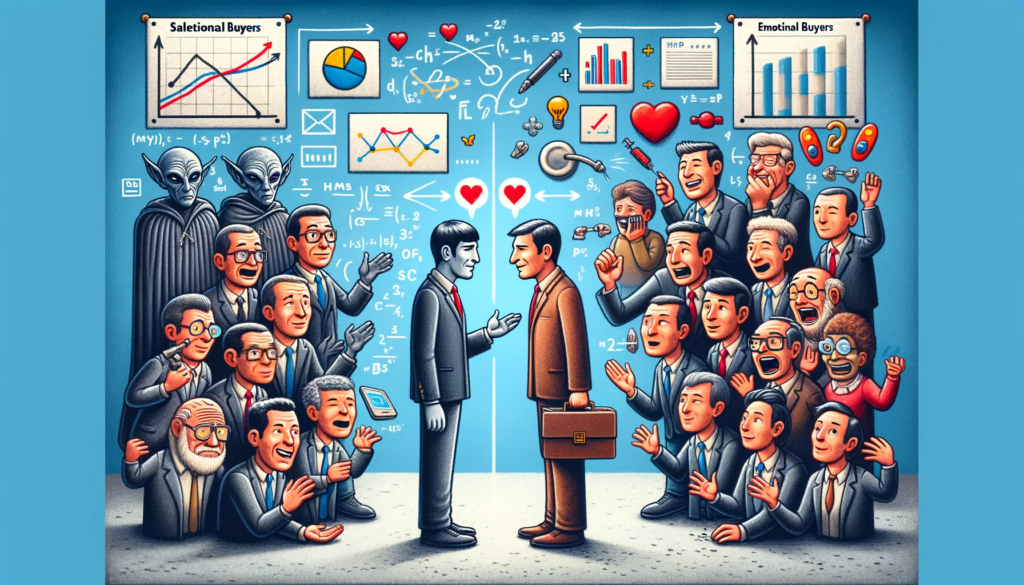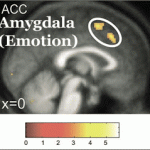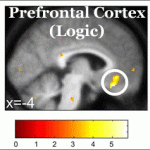
There’s a tendency for salespeople to concentrate on logic because they feel that emotions are too flaky to have any real importance on a buying decision. But economists have recently embraced the idea that irrational psychology, rather than cool calculation, plays a significant role in buying decisions.
Skeptical salespeople may be interested to hear that it’s now scientifically proven that emotions play a big role in decision making. Emotions generated through negatively framed decisions, for instance, can affect how we decide by as much as 44%.
Emotion Guides “Logical” Decisions
 Benedetto De Martino, at the University College of London in 2006, for example, asked 20 people to undergo three 17-minute brain scans while being asked to gamble or not. They were given 100 pounds and when told that they would “keep” 40% of their money if they didn’t gamble, the volunteers chose to gamble only 43% of the time. However, when the question was negatively framed that they could “lose” 60% of their money if they didn’t gamble, they rolled the dice more—62% of the time. By stressing risk vs. gain, they were able to influence/skew decisions to gamble by 44% (43% to 62%).
Benedetto De Martino, at the University College of London in 2006, for example, asked 20 people to undergo three 17-minute brain scans while being asked to gamble or not. They were given 100 pounds and when told that they would “keep” 40% of their money if they didn’t gamble, the volunteers chose to gamble only 43% of the time. However, when the question was negatively framed that they could “lose” 60% of their money if they didn’t gamble, they rolled the dice more—62% of the time. By stressing risk vs. gain, they were able to influence/skew decisions to gamble by 44% (43% to 62%).
 More important, in brain scans, both the Amygdala (brain section thought to control emotions) and the Prefrontal Cortex (brain section thought to control logic) showed activity. Even the participants who voted rationally had both their emotional and logical sections of their brain firing up: It’s as if both sides of the brain were going to war over the decision.
More important, in brain scans, both the Amygdala (brain section thought to control emotions) and the Prefrontal Cortex (brain section thought to control logic) showed activity. Even the participants who voted rationally had both their emotional and logical sections of their brain firing up: It’s as if both sides of the brain were going to war over the decision.
 So, the takeaway is that great Salespeople must not just sell to Mr. Logic but also to Mr. Emotional. Indeed, selling only to Mr. Logic (left brain) ends in paralysis through analysis because Mr. Logic always needs more information. Mr. Emotional (right brain), on the other hand, is able to take a leap of faith and make a decision because he is able to see both the big picture and fill in the gaps. It seems science has finally been able to support the old sales expression ‘buy on emotion; justify with logic.’
So, the takeaway is that great Salespeople must not just sell to Mr. Logic but also to Mr. Emotional. Indeed, selling only to Mr. Logic (left brain) ends in paralysis through analysis because Mr. Logic always needs more information. Mr. Emotional (right brain), on the other hand, is able to take a leap of faith and make a decision because he is able to see both the big picture and fill in the gaps. It seems science has finally been able to support the old sales expression ‘buy on emotion; justify with logic.’
According to another brain research study, Antonio Damasio concluded that people can’t make decisions without emotion. Antonio studied people who received unique brain injuries that were isolated to the part of the brain that feels emotion. Without emotion, their ability to make decisions was seriously impaired. The more they deliberated where to go for dinner, for instance, the more the pros and cons seemed to became limitless. With no emotional value system, they were unable to decide and paralysis through analysis set in.
Because science now proves that it’s a flawed strategy to only sell to Mr. Logic, Salespeople must learn to add emotion to their sales message.
“Optimized Schedules” vs. “Time for Kid’s Hockey” — What’s More Effective?
 One approach is to tell a story, because a story is simply “a fact wrapped up in emotion.” Here’s a brief example.
One approach is to tell a story, because a story is simply “a fact wrapped up in emotion.” Here’s a brief example.
David, a sales representative, has schedule a second meeting with Mark, VP of Planning. But the sale wasn’t advancing. Instead of presenting yet again how their software could optimize planning schedules in less time, David decided to change his approach. He told Mark a story about how a similar customer was tired of putting in 90-hour work weeks just to keep up with the latest round of cost cuts. It was sad, David said, when his family had stopped complaining about how he hadn’t had dinner with them in months. But it wasn’t until his kids complained that he was now sleeping all weekend just to rest-up for another impossible workweek that he finally decided to free up his time by purchasing our software.
This story really helped advance the sale with Mark because he was disappointed that his work had prevented him from making it out this season to coach his kids’ hockey games.
So next time the buyer’s amygdala and prefrontal cortex fire up, make sure that you tell a story to influence both sides of the brain!
-Michael

